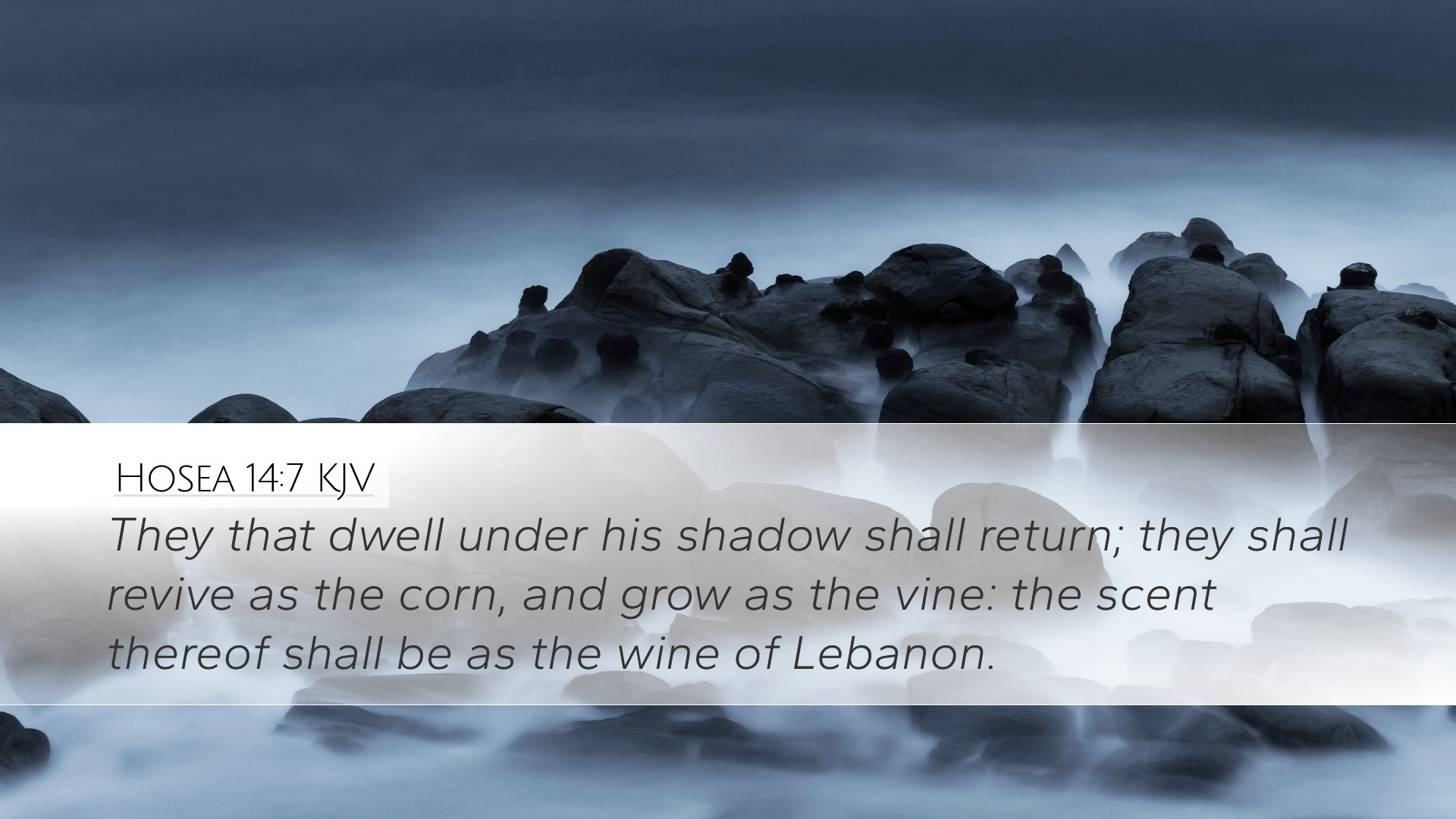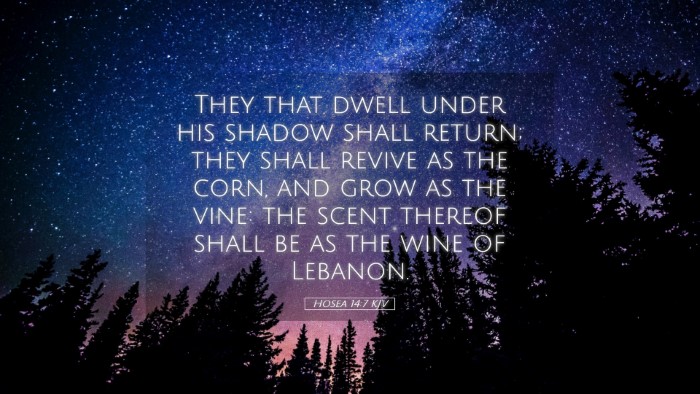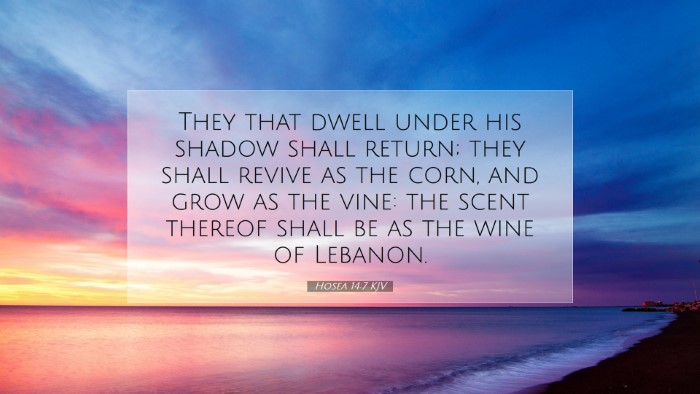Old Testament
Genesis Exodus Leviticus Numbers Deuteronomy Joshua Judges Ruth 1 Samuel 2 Samuel 1 Kings 2 Kings 1 Chronicles 2 Chronicles Ezra Nehemiah Esther Job Psalms Proverbs Ecclesiastes Song of Solomon Isaiah Jeremiah Lamentations Ezekiel Daniel Hosea Joel Amos Obadiah Jonah Micah Nahum Habakkuk Zephaniah Haggai Zechariah MalachiHosea 14:7
Hosea 14:7 KJV
They that dwell under his shadow shall return; they shall revive as the corn, and grow as the vine: the scent thereof shall be as the wine of Lebanon.
Hosea 14:7 Bible Commentary
Commentary on Hosea 14:7
Hosea 14:7 states: "They that dwell under his shadow shall return; they shall revive as the corn, and grow as the vine: the scent thereof shall be as the wine of Lebanon."
Introduction
This verse concludes the book of Hosea, encapsulating the theme of restoration and hope for Israel. After many chapters of rebuke and prophetic warning, Hosea offers a picture of renewal and divine favor. The insights from public domain commentaries provide a rich exploration of this verse.
Insights from Commentaries
Matthew Henry's Commentary
Matthew Henry emphasizes the imagery of the "shadow" as representing God's protection and blessing. By dwelling under God's shadow, the faithful feel secure and nourished, akin to a plant thriving in a favorable environment.
- Revitalization: The phrase "shall revive as the corn" suggests a miraculous restoration. Henry points out that corn is a staple crop, highlighting that the revival is essential and systemic within the community. It indicates economic and spiritual renewal.
- Growth and Abundance: The comparison to the vine points to the luxurious nature of God's blessings. Henry suggests that a vine not only grows but produces fruit, signifying that spiritual vitality results in tangible blessings for the community.
- Significance of Aroma: The "scent thereof shall be as the wine of Lebanon" denotes a rich and inviting fragrance, often associated with prosperity and celebration. Henry interprets this as the idea that God's people will be renowned for their spiritual fruitfulness, drawing others towards the faith.
Albert Barnes' Notes on the Bible
Albert Barnes offers a more detailed analysis of the metaphorical language used in this verse, revealing layers of meaning that speak to God’s promise of revival.
- Restoration Following Repentance: Barnes notes that the preceding chapters of Hosea depict a nation in rebellion. This verse implies that upon returning to the Lord, the people will experience substantial restoration. This mirrors the themes of repentance woven throughout scripture.
- Community Aspects: "They that dwell" refers not only to individuals but to a community under God's protective care. The collective revival signifies that the effects of faith extend to all, enriching communal life.
- Symbolism of Lebanon: The reference to the "wine of Lebanon" is significant because Lebanese wine was highly esteemed and associated with joy and festivity. Barnes elucidates that just as wine brings joy, so does the blessing of God bring rejoicing among His people.
Adam Clarke's Commentary
Adam Clarke provides a contextual examination of Hosea's prophecies, focusing on the historical and theological implications of the text.
- Theological Interpretation: Clarke posits that God desires His people to dwell in His presence, where they experience divine blessings. This reflects a relational aspect of faith, where proximity to God leads to personal and communal flourishing.
- Cultivating Spiritual Fruit: The mention of "growing as the vine" is interpreted as a call to produce spiritual fruit. Clarke stresses that this growth is not merely for sustenance but serves a purpose of outreach and attracting others to the faith.
- Hope and Expectation: Clarke's commentary underlines the importance of hope in the life of believers, suggesting that even in the context of judgment, God's mercy shines through, inviting His people to return and be renewed.
Theological Themes
The theological implications of Hosea 14:7 are profound, and the insights from these commentators help to elucidate several key themes:
- God’s Faithfulness: The promise of restoration reflects God's unwavering faithfulness. Even when Israel strayed, God remained ready to welcome them back, showcasing a loving commitment to His covenant people.
- Repentance and Renewal: The path to revival is often paved with repentance. The call to return implies an acknowledgment of wrongdoing, fostering a community that recognizes its faults and seeks divine forgiveness.
- Symbolism of Growth: The metaphors used indicate a season of growth, highlighting the transformative power of God's grace in the lives of believers, encouraging them to flourish spiritually.
Conclusion
Hosea 14:7 stands out as a beacon of hope and restoration, reminding readers of God's desire for His people to dwell in His presence and experience revitalization. As pastors, students, theologians, and Bible scholars reflect on this verse, they are invited to consider the implications of divine mercy, communal revival, and the abundant life offered through faith in God. The insights from Matthew Henry, Albert Barnes, and Adam Clarke serve as a rich tapestry of understanding, encouraging deeper exploration of scripture and inspiring faith-filled living.


